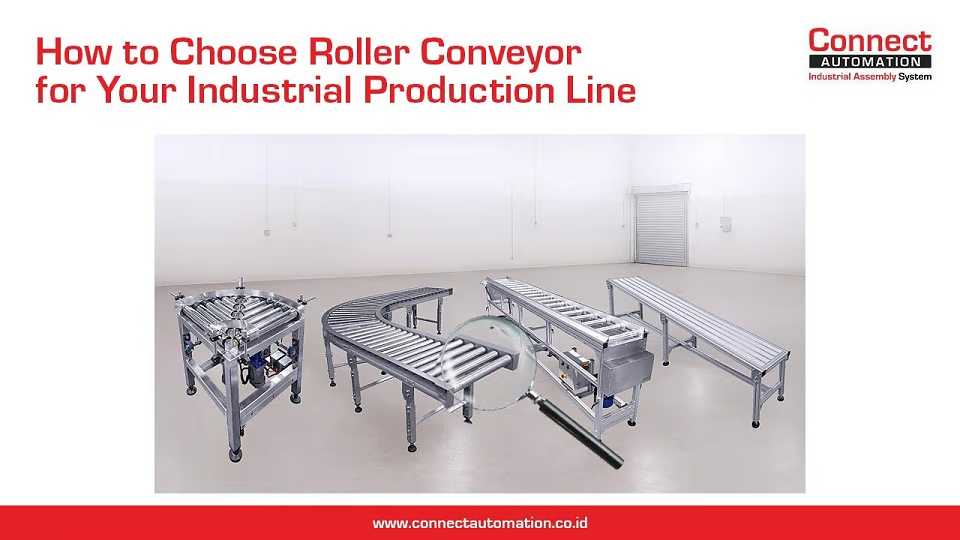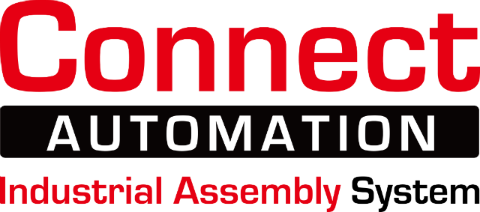REQUEST A FREE ESTIMATE!
How to Choose Roller Conveyor for Your Industrial Production Line

A roller conveyor is an industrial conveyor system that uses a series of rotating cylinders (rollers) to move products from one point to another. Depending on your workflow, the system can be manual (gravity roller conveyor) or motor-driven (powered roller conveyor). Roller conveyors are widely used in industries such as:
- Food & Beverage
- Pharmaceutical
- Warehousing & Logistics
- Automotive
- Electronics & Light Manufacturing
With their efficient and modular design, roller conveyors improve production speed, reduce manual handling, and increase workplace safety.
Types of Roller Conveyors and Their Functions
Gravity Roller Conveyor
The gravity roller conveyor operates without a motor — products move by gravity or manual push. This type is ideal for simple transfer lines, such as packing, sorting, or inspection areas.
-
Best For:
- Lightweight to medium-weight products
- Manual packing and sorting areas
-
Advantages:
- Low investment cost
- Easy to install and relocate
- Minimal maintenance
-
Disadvantages:
- Not suitable for full automation
- Requires slope or manual assistance
Power Roller Conveyor
A powered roller conveyor uses a motor drive — typically via chain or belt — to move products continuously. It’s ideal for automated production systems and high-volume operations.
-
Best For:
- Heavy products or large volumes
- Automated production lines with sensors or PLC integration
-
Advantages:
- Stable and controllable speed
- High efficiency and productivity
- Compatible with automation systems
-
Disadvantages:
- Higher initial and maintenance cost
Flat Roller Conveyor
The flat roller conveyor provides a stable, even surface for flat-bottomed products such as boxes, trays, or packaged goods.
-
Best For:
- Inspection, packaging, or labeling processes
-
Advantages:
- Stable and safe for packaged items
- Compatible with sensors or automation integration
-
Disadvantages:
- Not suitable for irregular or round items
Flexible Roller Conveyor
A flexible roller conveyor can be extended, folded, or curved to adapt to different working areas. This type is ideal for warehouses, loading docks, or variable logistics routes.
-
Best For:
- Dynamic warehouse layouts
- Loading and unloading areas
-
Advantages:
- Highly flexible and easy to adjust
- No need for permanent installation
-
Disadvantages:
- Limited load capacity
- Less ideal for long-term continuous use
Ball Transfer Conveyor
Unlike traditional rollers, this system uses free-rotating steel balls that allow products to move in any direction (360°) without lifting. Ball transfer conveyors are perfect for transfer, sorting, and direction-change points.
-
Best For:
- Flat-bottom items (boxes, pallets, metal plates)
- Workstations and distribution areas
-
Advantages:
- Smooth multi-directional movement
- Ideal for stationary transfer zones
- Easily integrated with other conveyor systems
-
Disadvantages:
- Not suitable for uneven or heavy items
- Inefficient for long-distance transfers
How to Choose the Right Roller Conveyor
- Type of Product. Is your product box-shaped, cylindrical, or irregular? Flat-bottom items work best with standard roller conveyors, while lighter items requiring flexible movement may suit ball transfer conveyors.
- Product Weight and Size. Heavier items require larger-diameter and thicker rollers to ensure smooth and safe handling.
- Production Environment. For wet or corrosive environments, choose stainless steel roller conveyors for durability. In dry or indoor environments, galvanized steel or aluminum options are sufficient.
- Automation Requirements. If your production system uses sensors, interlocks, or PLCs, choose a powered roller conveyor for reliable automated operation.
- Space Flexibility. If your workspace frequently changes layout, a flexible roller conveyor allows for easy adjustment without permanent installation.
If you’re looking for a customized, modular, and expandable roller conveyor system, the Connect Automation team can help you design and build the perfect conveyor solution tailored to your industrial needs.
Connect Automation specializes in providing automation solutions, including conveyor systems, to improve efficiency across various industries. The company delivers cutting-edge technology to help organizations automate tasks and optimize workflows. Connect Automation helps businesses reduce manual efforts, boost productivity, and achieve better outcomes. With a customer-focused approach, the company designs tailored solutions to ensure smooth and effective automation transitions for long-term success.
Kawasan Industri Jababeka Tahap 1, Jl. Jababeka II D Blok C14L Cikarang, Indonesia (17530)
(021) 893 5060 Google Maps
Rungkut Industri III, No. 37, Rungkut Menanggal, Kec. Gn. Anyar Surabaya, Indonesia (60293)
(031) 9985 8624 Google Maps
